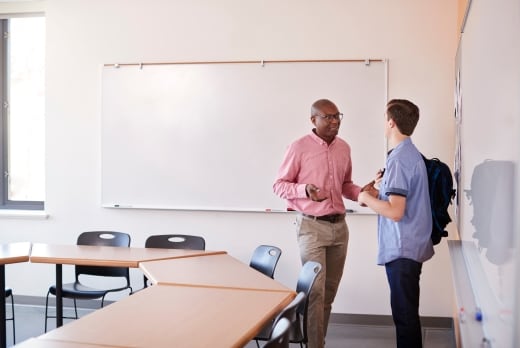Updated: May 22, 2023
Article highlights
- Do a little research before visiting campus to make sure you get the most out of each tour (and that the college won’t be closed to visitors when you plan your trip).
- Virtual tours and a college’s social media pages are a great way to gain insight into campus culture. Look at these before planning your itinerary to help narrow down your list of colleges to visit.
- Plan your tour while classes are in session so you can get a better feel for campus life.
A college tour is an opportunity for you to check out the colleges you are interested in. A little preparation before your campus visit can help you get the most out of your trip and ultimately help narrow down your college choices.
1. Start early
There are two types of college visits: Those you go before you submit your applications, and those you attend once you’ve been offered an acceptance. Taking tours early is a great way for you to get a better sense of your top choices. Try to schedule those first college campus visits during your junior year in high school. Earlier planning and preparation provide more time and opportunity to evaluate options and even revisit certain campuses to narrow down your college list.
Of course, not everyone has the resources to make multiple campus visits, especially for colleges located far away. If that’s the case, you might want to save the tours until after the acceptance letters have come in.
2. Take a virtual tour
Many colleges offer virtual- as well as in-person tours of their campus. Some of these are pre-recorded, while others are live, allowing prospective students to ask questions about college life. While a virtual tour isn’t a replacement for visiting in-person—keep in mind they’re essentially a highlight reel of a college’s best features—they can be a handy way to whittle down your list, and save money.
3. Consider the type of in-person tour
When visiting a college, you likely have the option to take an official campus tour organized by the school. Your guide, typically a current student, will show you the main spots on campus, discuss student life, and share their personal college experiences. On official tours, you can ask questions that allow you to get a better sense of the college culture.
If the school permits, you might also want to take an unofficial tour, which allows you to explore the campus on your own. With a self-guided tour, you can visit places you’re interested in that the official tour didn’t get to, like the biology building or the library cafe. A self-guided tour is a great way to explore the college in the off-season, if that’s the only time available to you.
4. Visit while classes are in session
Schedule your tour during the school year so your child can get a better feel for campus life. Many colleges offer overnight visits, which include planned activities with current students and a stay in the dorms so your child can experience, firsthand, what life on campus is like.
5. Connect via social media
You can learn a lot about a college by visiting their social media pages. In addition to scrolling through official pages, you can look for college hashtags on a variety of platforms to get a better sense of student life. Many colleges also have group pages for interested students. Connecting with these groups early allows better insight into the college and you can interact with other interested students, as well as current students, alumni, and even faculty and staff.
6. Prepare for each campus visit
Some colleges may have certain health requirements—such as up-to-date COVID vaccines, or proof of a negative test—before allowing visitors to tour their campuses. Before scheduling your visit, do a little research to see what the policies are for the schools on your list.
Many colleges like to keep their tours small, so it’s important to register well in advance. See what each college’s tour schedule is like to ensure they are open for visitors when you plan to go.
It's also important to prepare a short list of questions to ask during your visit based on what you’re most interested in at a particular college. Do you have a particular major in mind? Ask questions about the program. Do you perform better in small groups? Ask about class sizes, or if classes are more discussion- or lecture-based.
7. Schedule on-campus meetings
During your visit, you should meet with representatives from the admissions and financial aid office to learn about the application process and financial aid opportunities. College visits are a great time to organize an interview with an admissions officer, which can help bolster your application. It's also a good idea to meet with an academic advisor and a faculty member or department head for your field of study. Don't forget to write a thank you note to the people you met with during your campus visit.
8. Record your visit
After a while, one college campus can blur into the next. To help keep each visit straight, be sure to take notes and pictures, and collect flyers and campus newspapers. Also, make a note of everyone you met—especially admissions officers—so you can follow up with any questions later. You can even create a rating system to evaluate each college.
9. Keep an open mind
There are lots of reasons you might dismiss a college, some rationale, some not. Don’t let things like the weather, the color of the school’s football jerseys, or the opinions of someone who isn’t you cloud your judgment. You’ll be the one attending college, which means yours is the only opinion that matters. In the end, trust your gut, and have fun!
Look forward to a brighter future.
Enter to win a $5,000 scholarship for school.
*NO PURCHASE OR CREDIT CARD APPLICATION OR ACCOUNT NECESSARY. Sweepstakes open to residents of the 50 United States (DC) and the US Territories 18 years or older. Sweepstakes starts 9/3/2024 and ends 8/31/2025. See Official Rules for eligibility and entry requirements, entry deadlines and drawing dates, details including odds, list of eligible colleges and universities, prize descriptions and an alternate method of entry. Void where prohibited.
Sponsor: Discover Products Inc. 2500 Lake Cook Road, Riverwoods, IL 60015











